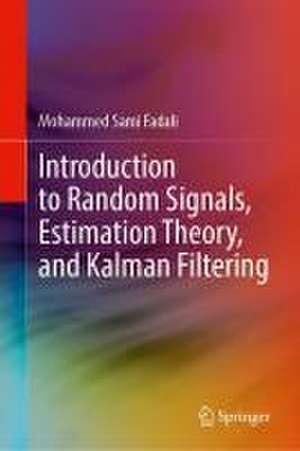Introduction to Random Signals, Estimation Theory, and Kalman Filtering
Autor M. Sami Fadalien Limba Engleză Hardback – 2 apr 2024
Preț: 656.89 lei
Preț vechi: 772.81 lei
-15% Nou
Puncte Express: 985
Preț estimativ în valută:
125.71€ • 129.87$ • 104.62£
125.71€ • 129.87$ • 104.62£
Carte tipărită la comandă
Livrare economică 26 martie-09 aprilie
Preluare comenzi: 021 569.72.76
Specificații
ISBN-13: 9789819980628
ISBN-10: 9819980623
Ilustrații: XXI, 480 p. 118 illus., 79 illus. in color.
Dimensiuni: 155 x 235 mm
Greutate: 0.88 kg
Ediția:2024
Editura: Springer Nature Singapore
Colecția Springer
Locul publicării:Singapore, Singapore
ISBN-10: 9819980623
Ilustrații: XXI, 480 p. 118 illus., 79 illus. in color.
Dimensiuni: 155 x 235 mm
Greutate: 0.88 kg
Ediția:2024
Editura: Springer Nature Singapore
Colecția Springer
Locul publicării:Singapore, Singapore
Cuprins
Review of Probability Theory.- Random Variables.- Random Signals (autocorrelation, power spectral density).- Response of Linear Systems to Random Inputs (continuous, discrete).- Estimation and Estimator Properties (small sample and large sample properties of estimators, CRLB).- Least Square Estimation Likelihood (likelihood function, detection).- Maximum Likelihood Estimation.- Minimum Mean-Square Error Estimation (Kalman Filter, information filter, filter stability).- Generalizing the Basic Kalman Filter (colored noise, correlated noise, reduced-order estimator, Schmidt Kalman filter sequential computation).- Prediction and Smoothing.- Nonlinear Filtering (Extended Kalman filter, unscented Kalman filter, ensemble Kalman filter, particle filter).- The Expectation Maximization Algorithm.- Markov Models.
Notă biografică
M. Sami Fadali earned a B.S. in Electrical Engineering from Cairo University in 1974, an M.S. from the Control Systems Center, UMIST, England, in 1977, and a Ph.D. from the University of Wyoming in 1980. He was an Assistant Professor of Electrical Engineering at the University of King Abdul Aziz in Jeddah, Saudi Arabia from 1981-1983. From 1983-85, he was a Postdoctoral Fellow at Colorado State University. In 1985, he joined the Electrical Engineering Department at the University of Nevada, Reno, where he is currently Professor of Electrical Engineering. In 1994, he was a Visiting Professor at Oakland University and GM Research and Development Laboratories. He spent the summer of 2000 as a Senior Engineer at TRW, San Bernardino. His research interests are in fuzzy logic stability and control, state estimation and fault detection, and applications to power systems, renewable energy, and physiological systems.
Textul de pe ultima copertă
This book provides first-year graduate engineering students and practicing engineers with a solid introduction to random signals and estimation. It includes a statistical background that is often omitted in other textbooks but is essential for a clear understanding of estimators and their properties. The book emphasizes applicability rather than mathematical theory. It includes many examples and exercises to demonstrate and learn the theory that makes extensive use of MATLAB and its toolboxes. Although there are several excellent books on random signals and Kalman filtering, this book fulfills the need for a book that is suitable for a single-semester course that covers both random signals and Kalman filters and is used for a two-semester course for students that need remedial background. For students interested in more advanced studies in the area, the book provides a bridge between typical undergraduate engineering education and more advanced graduate-level courses.
Caracteristici
Bridges between the typical undergraduate engineering education and more advanced graduate-level courses Includes examples and exercises to demonstrate the theory that makes extensive use of MATLAB Provides a solid introduction to random signals and estimation
